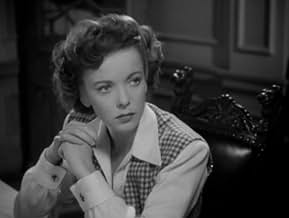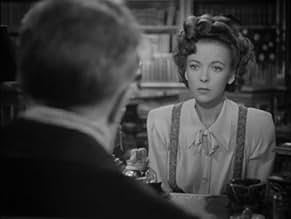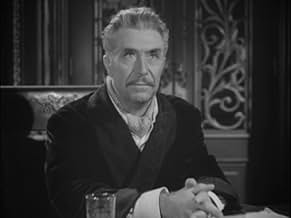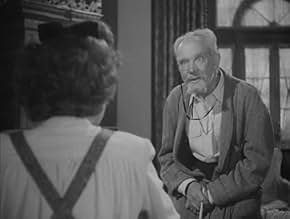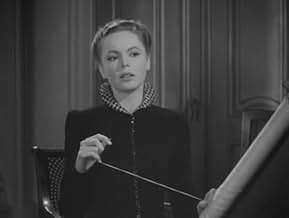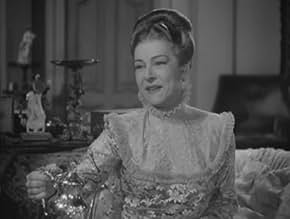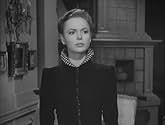Füge eine Handlung in deiner Sprache hinzuA young woman traveling to Poland with her employer meets a count, and they fall in love as World War II begins.A young woman traveling to Poland with her employer meets a count, and they fall in love as World War II begins.A young woman traveling to Poland with her employer meets a count, and they fall in love as World War II begins.
- Regie
- Drehbuch
- Hauptbesetzung
Alla Nazimova
- Zofia Orwid
- (as Nazimova)
Harry Adams
- Ballet Attendee
- (Nicht genannt)
Alex Akimoff
- Wine Seller
- (Nicht genannt)
Sylvia Arslan
- Naneczka
- (Nicht genannt)
Lynn Baggett
- Friend of Count Orvid
- (Nicht genannt)
George Blagoi
- Polish Peasant
- (Nicht genannt)
John Bleifer
- Wladek
- (Nicht genannt)
Paul Bradley
- Ballet Attendee
- (Nicht genannt)
Cyd Charisse
- Ballerina
- (Nicht genannt)
Gino Corrado
- Peasant at Party
- (Nicht genannt)
- …
Julius Cramer
- Polish Diplomat
- (Nicht genannt)
Jane Crowley
- Party Guest
- (Nicht genannt)
Empfohlene Bewertungen
"In Our Time" from 1944 is a propaganda movie set in Poland starring Paul Henried, Ida Lupino, Nazimova, Nancy Coleman, Victor Francen, and Michael Chekhov, and directed by Vincent Sherman.
The script, by Ellis St. Joseph and Howard Koch, is reminiscent in some ways to Rebecca and to Gone with the Wind. Jennifer Whittridge (Lupino) is traveling as a secretary to an antique dealer (Mary Boland) in Poland in 1939 when she meets Count Stephen Orvid (Henried). Henried mistakenly believes Jennifer is good for a quick fling, but he realizes soon enough that's not the case. As Jennifer's trip draws to an end, he proposes, and she accepts though his aristocratic family objects. In order to live independently of his uncle (Victor Franzen), Stephen and Jenny employ modern techniques on the farm and incentivize the peasants by giving them a share of the harvest. Then the war comes to Poland.
There are good performances by everyone involved. The film moves slowly but one feels the tension of the approaching war. Some of that tension may be due to the viewer knowing that Poland was in for one miserable time not only during the war, but after under Communism.
Paul Henried had his real heyday during WWII since the usual leading men were off fighting the war; Ida Lupino, since she was at Warners, always wound up with Bette Davis' handoffs and later distinguished herself on television and as a director. She and Henried make you care about the characters.
It's odd to have a film set in Poland, odder still that Poland's radio announcements were in English. Eastern Europe's WWII story is a tragic one, and it wasn't shown in film all that often.
The script, by Ellis St. Joseph and Howard Koch, is reminiscent in some ways to Rebecca and to Gone with the Wind. Jennifer Whittridge (Lupino) is traveling as a secretary to an antique dealer (Mary Boland) in Poland in 1939 when she meets Count Stephen Orvid (Henried). Henried mistakenly believes Jennifer is good for a quick fling, but he realizes soon enough that's not the case. As Jennifer's trip draws to an end, he proposes, and she accepts though his aristocratic family objects. In order to live independently of his uncle (Victor Franzen), Stephen and Jenny employ modern techniques on the farm and incentivize the peasants by giving them a share of the harvest. Then the war comes to Poland.
There are good performances by everyone involved. The film moves slowly but one feels the tension of the approaching war. Some of that tension may be due to the viewer knowing that Poland was in for one miserable time not only during the war, but after under Communism.
Paul Henried had his real heyday during WWII since the usual leading men were off fighting the war; Ida Lupino, since she was at Warners, always wound up with Bette Davis' handoffs and later distinguished herself on television and as a director. She and Henried make you care about the characters.
It's odd to have a film set in Poland, odder still that Poland's radio announcements were in English. Eastern Europe's WWII story is a tragic one, and it wasn't shown in film all that often.
IDA LUPINO is a British young woman visiting Poland and acting as a companion to MARY BOLAND, a wealthy woman fond of collecting antiques. At an antique shop, Ida runs into PAUL HENRIED, who thinks she works at the store. They meet and fall in love, and Ida discovers that he's a Polish count. He insists on showing her around Warsaw and in a few short days they fall in love and, although Ida has misgivings when she meets his family and fails to pass inspection, they do marry.
Then the Nazi invasion of Poland looms over the story for the second half of the film. The script is articulate and literate, dealing as it does with the aristocracy for the most part, but terribly slow-moving and Vincent Sherman's direction fails to give the script the pace it needs to maintain interest.
Ida plays a more rational and less intense creature than she usually does and gives an assured performance as the British girl who must adjust to her new husband and his family. NANCY COLEMAN is his regal, spoiled sister, NAZIMOVA is his party-loving mother, and VICTOR FRANCEN is Henried's wealthy uncle, a Count who keeps the family financially solvent.
But Poland is unable to avoid falling into Hitler's clutches and the story veers into more serious territory with the advent of war and the decision that Henried must make with regard to Poland under Nazi rule.
Summing up: A bit tedious at times, but interesting for the performances of Lupino, Henried, Coleman, Francen, Nazimova, Mary Boland and Franz Waxman's melodramatic score.
Then the Nazi invasion of Poland looms over the story for the second half of the film. The script is articulate and literate, dealing as it does with the aristocracy for the most part, but terribly slow-moving and Vincent Sherman's direction fails to give the script the pace it needs to maintain interest.
Ida plays a more rational and less intense creature than she usually does and gives an assured performance as the British girl who must adjust to her new husband and his family. NANCY COLEMAN is his regal, spoiled sister, NAZIMOVA is his party-loving mother, and VICTOR FRANCEN is Henried's wealthy uncle, a Count who keeps the family financially solvent.
But Poland is unable to avoid falling into Hitler's clutches and the story veers into more serious territory with the advent of war and the decision that Henried must make with regard to Poland under Nazi rule.
Summing up: A bit tedious at times, but interesting for the performances of Lupino, Henried, Coleman, Francen, Nazimova, Mary Boland and Franz Waxman's melodramatic score.
In Our Time English girl Ida Lupino goes traveling with a somewhat subdued
Mary Boland and meets up with a real honest to goodness count played by
Paul Henreid. It's a romance that develops between them and she becomes a
countess.
Henreid is the kind of guy rich girls married back in the day for the title. He has an estate that's tied up in debt. They have to modernize or go broke. But with war clouds on the horizon will they have a chance?
This film is a tribute to the resistance of the Polish people in much the same way Edge Of Darkness is to the Norwegians. It came to the attention of the House Un-American Activities Committee and its writer Hpward Koch made the blacklist.
When Ida Lupino talks about having the estate peasants share in the harvest and maybe bringing in tractors she runs into some bad reaction from Victor Francen the old mastodon head of the family. God made him an aristocrat and them peasants and as an aristorat he's entitled to the perks therein. All this talk about sharing and brotherhood got the HUAC investigators attention.
In the end there's a note of optimism as this film came out in 1944 and the tide of war had turned and the audience who saw In Our Time knew it. The collective cast members fates are left to your imagination.
This wartime film still holds up well even today as recent events show fasciam is very much alive in this world and in places Americans did not contemplate in 1944.
Henreid is the kind of guy rich girls married back in the day for the title. He has an estate that's tied up in debt. They have to modernize or go broke. But with war clouds on the horizon will they have a chance?
This film is a tribute to the resistance of the Polish people in much the same way Edge Of Darkness is to the Norwegians. It came to the attention of the House Un-American Activities Committee and its writer Hpward Koch made the blacklist.
When Ida Lupino talks about having the estate peasants share in the harvest and maybe bringing in tractors she runs into some bad reaction from Victor Francen the old mastodon head of the family. God made him an aristocrat and them peasants and as an aristorat he's entitled to the perks therein. All this talk about sharing and brotherhood got the HUAC investigators attention.
In the end there's a note of optimism as this film came out in 1944 and the tide of war had turned and the audience who saw In Our Time knew it. The collective cast members fates are left to your imagination.
This wartime film still holds up well even today as recent events show fasciam is very much alive in this world and in places Americans did not contemplate in 1944.
Very enjoyable indeed. I always enjoyed the stoic acting of Paul Henreid anyway and to see the very attractive and talented Ida Lupino at age 26 was a treat.
The important idea of a beau, either male or female, not being good enough for the family into which he or she's becoming a part of through marriage, is ancient. I know that here in the USA, it reigns galore but of course from studying history, I had learned that the "quality" of the beau in aristocratic Europe families was intense. Like for instance, here in the USA, family crests and all that jazz are meaningless but not so in Europe. There, lineage, pomp and ceremony are of supreme importance.
This is why Ida Lupino's entrance into the family of Count Orvid's of Poland is fascinating. It was like pitting the old Brooklyn Dodgers against the mighty New York Yankees in so many World Series games. Obviously in the film, Dodger Lupino didn't stand a chance except for uncle Leopold Baruta's warm understanding of why aristocracy shouldn't destroy love.
In the meantime, this enchanting love story is set in the backdrop of maniac Hitler's preparations for invading Poland. The film therefore has tension cleverly wound within the fabric of the entire film. And what will happen to the love affair and marriage of Ida and Paul once Hitler attacks? See for yourself--it's a good movie on Turner Classics.
The important idea of a beau, either male or female, not being good enough for the family into which he or she's becoming a part of through marriage, is ancient. I know that here in the USA, it reigns galore but of course from studying history, I had learned that the "quality" of the beau in aristocratic Europe families was intense. Like for instance, here in the USA, family crests and all that jazz are meaningless but not so in Europe. There, lineage, pomp and ceremony are of supreme importance.
This is why Ida Lupino's entrance into the family of Count Orvid's of Poland is fascinating. It was like pitting the old Brooklyn Dodgers against the mighty New York Yankees in so many World Series games. Obviously in the film, Dodger Lupino didn't stand a chance except for uncle Leopold Baruta's warm understanding of why aristocracy shouldn't destroy love.
In the meantime, this enchanting love story is set in the backdrop of maniac Hitler's preparations for invading Poland. The film therefore has tension cleverly wound within the fabric of the entire film. And what will happen to the love affair and marriage of Ida and Paul once Hitler attacks? See for yourself--it's a good movie on Turner Classics.
Ida Lupino and Paul Henreid both were very good actors, but very often they were either cast as either supporting actors or starred in smaller and less prestigious films. Here, however, Warner Brothers put both of them in a top film and gave them both a chance to shine--and they were more than up to the task. In particular, Lupino was lovely. Her performance was strong but also with a lot of style--she really was in her element here.
The film begins in the mid-late 1930s in Poland. Ida and her boss (Mary Boland) are visiting the country to buy antiques to take back to Boland's business in England. Shortly after the story begins, a local nobleman (Henreid) meets Lupino and is obviously smitten with her. When he asks her to marry him, there is a bit of a scandal within the family--after all, she is just a commoner. This romance and its repercussions make up the first 2/3 of the film.
At the same time, there are small hints here and there about the upcoming invasion of Poland by the Nazis--something with which audiences of 1944 would have been well acquainted. Eventually, the Nazi hoards invade and Henreid is called to active duty and the inevitable conquest begins.
Overall, there is a lot to like about this film. As I said above, the acting is very, very good. Plus, Henreid and Lupino are ably assisted by various supporting actors that also rise to the occasion. The direction and cinematography are also first-rate. These factors, combined with a good story, make for a very good film--a propaganda film with greater depth than usual and which is still very watchable today.
The film begins in the mid-late 1930s in Poland. Ida and her boss (Mary Boland) are visiting the country to buy antiques to take back to Boland's business in England. Shortly after the story begins, a local nobleman (Henreid) meets Lupino and is obviously smitten with her. When he asks her to marry him, there is a bit of a scandal within the family--after all, she is just a commoner. This romance and its repercussions make up the first 2/3 of the film.
At the same time, there are small hints here and there about the upcoming invasion of Poland by the Nazis--something with which audiences of 1944 would have been well acquainted. Eventually, the Nazi hoards invade and Henreid is called to active duty and the inevitable conquest begins.
Overall, there is a lot to like about this film. As I said above, the acting is very, very good. Plus, Henreid and Lupino are ably assisted by various supporting actors that also rise to the occasion. The direction and cinematography are also first-rate. These factors, combined with a good story, make for a very good film--a propaganda film with greater depth than usual and which is still very watchable today.
Wusstest du schon
- WissenswertesCount Stefan takes Jennifer on a walking tour of Warsaw. As they walk, stock footage is shown of various important monuments, culminating in the bronze statue of Chopin by sculptor Waclaw Szymanowski. These monuments were all systematically destroyed by the Germans in 1940.
- PatzerAt the ballet, Count Stefan and others in his box use the opera glasses to look down at Jennifer in the audience below. The first shot through the glasses shows her not looking straight up at Count Stefan, but to her right, even though they have acknowledged each other. In subsequent shots through the glasses, the perspectives are far too low and to the front of Jennifer to be from the box above.
- Zitate
Count Pawel Orwid: [at the ballet] Stefan, when I was a young man, I came for the ballerinas. Later on I came for the music. Now I come to sit.
- Crazy CreditsAfter the WB logo appears at the end, the letters W and B are separated and letters added to form the words "BUY War Bonds".
- VerbindungenFeatured in Frances Farmer Presents: In Our Time (1959)
- SoundtracksPolonaise in A major, Op.40, No.1 ('Military')
(1838-39) (uncredited)
Written by Frédéric Chopin
Partially played during the opening credits and at the end
Variation in the score throughout
Played on a radio to signal that Warsaw is still fighting
Top-Auswahl
Melde dich zum Bewerten an und greife auf die Watchlist für personalisierte Empfehlungen zu.
Details
- Erscheinungsdatum
- Herkunftsland
- Sprache
- Auch bekannt als
- Aşk milyona bedel
- Drehorte
- Produktionsfirma
- Weitere beteiligte Unternehmen bei IMDbPro anzeigen
- Laufzeit
- 1 Std. 50 Min.(110 min)
- Farbe
- Seitenverhältnis
- 1.37 : 1
Zu dieser Seite beitragen
Bearbeitung vorschlagen oder fehlenden Inhalt hinzufügen

